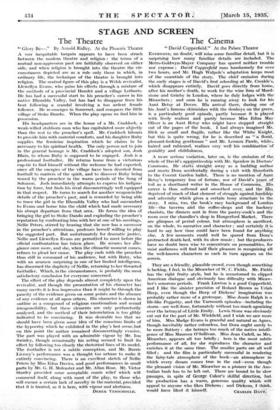The Cinema
"David CoPperfield." At the Palace Theatre EVERYONE, no doubt; will 'miss some familiar 'detail, but it is surprising how many familiar details are included. The Metro-Goldwyn-Mayer Company has spared neither trouble' nor expense ; David Cop:perfield runs handsomely for over two hours, and Mr. Hugh Walpole's adaptation keeps most of the essentials of the story. The chief omission during the early stages is of David's first schooling at 'Mr. Creakle's, which disappears entirely. David goes directly from home,. after his mother's death, tO work for the wine firuil of Muid- stone and Grinby in London, where he duly lodges with the' Micawbers ; and soon he is running away to look for hiS Aunt Betsy at Dover. His arrival there, during one of his Aunt's famous skirmishes with the donkeys on the green, is a particularly good eilisode, partly beeause it is played with lively realign and partly because Miss Edna May Oliver is an Aunt Betsy who might have stepped straight out of the pages of the book. I had always imagined Mr. Dick as small and fragile, rather like the White Knight, but this is quite wising; for he is described as "'a' florid, pleasant-looking gentleman" and Mr. Lennox Pawle, white- haired and rubicund,- realizes very well his combination of geniality and childishness.
A more serious variation, later on, is the omission of the. whole of David's ap*nticeship with Mr. Spenlow in Doctors' Commons. He starts straight away, as a budding author and meets Dora accidentally during a visit with Steerforth to the Covent Garden ballet. There is no mention of Aunt Betsy's temporary loss of fortune, nor of David's years of toil as a shorthand writer in the House of Commons. His career is thus softened and smoothed over, and the film deprived of much of that element of struggle against. hardship and adversity which gives a certain bony structure to the story. I miss, too, the hook's racy background of London life—the taverns and the coffee-shops and the hackney: chariots, the dinners sent in from the pastry-cook's and the room over the chandler's shop in Hungerford Market.. There arc glimpses of period colour, but atmosphere is sacrificed, on the whole, to narrative_and character ; and certainly it is hard to say how time could have been found for anything else. A few moments could well be spared from Dora's protracted death-bed, with its slow music; but the producers have no doubt been wise to concentrate on personalities, for racist audiences will find half their pleasure in recognizing all the well-known characters as each in turn appears on the screen.
They are a friendly, plausible crowd, even though something is lacking, I feel, in the Micawber of W. C. Fields. Mr. Fields has the right fruity :.style, but he is accustomed to clipped American dialogue and obviously has difficulty with Micaw- ber's sonorous periods. Frank Lawton is a good Copperfield, and I like the sinister precision of Roland Brown as Urialt Ireep, even though the Heep of Dickens' imagination was probably rather more of a grotesque. Miss Jessie Ralph is a life-like Peggotty, and the Yarmouth episodes—including the storm—are well done, fortunately without too much agonizing over the betrayal of Little Emily. Lewis Stone was obviously cut out for the part of Mr. Wickfield, and I wish we saw more of him. Miss Madge Evans is graceful and natural as Agnes, though inevitably rather colourless, but Dora ought surely to be more fluttery : she betrays too much of the native intelli- gence of Miss Maureen O'Sullivan. Miss Jean Cadell, as Mrs. Micawber, appears all too briefly.; hers is the most subtle performance of all, for she reproduces the character and enriches it at the same time. The smaller parts are all well filled ; and the film is particularly successful in -rendering the fairy-tale atmosphere of the book—an atmosphere in which every dream comes true in the end-even though the pleasant vision of Mr. Micawber as a pioneer in the Aus- tralian bush has to be left out. There are bound to be. slow passages, in spite Of George Cukor's skilful direction, but the production has a warm, generous quality which will appeal to anyone who likes Dickens ; and Dickens, I think,










































 Previous page
Previous page